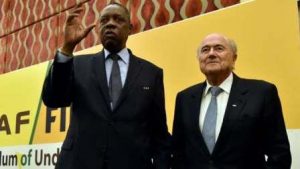With the resignation of Sepp Blatter coming just four days after his fifth re-election to the head of FIFA, many are wondering what is in store for Issa Hayatou, the head of the Confederation of African Football (CAF).
Some are saying he should be next in line for the head of FIFA, which will most likely vote another leader in by the spring. An obvious next choice, given FIFA’s commitment, especially under Blatter, to developing football programs across the global south nations.
But others across the media and twitterverse are calling for his resignation next — as an even longer incumbent and steeped just as deeply in scandal and allegations of corruption.
While Blatter has been re-elected to the head of FIFA consistently since 1998, Hayatou has sat at the head of African football even longer, since 1988. Since the arrival of Blatter, the African and Asian football federations have consistently and staunchly supported him. And in return have received billions in development program dollars. Even as the most recent scandal broke, Hayatou promised all 54 CAF votes for Blatter.
As the investigations continue into Qatar and Russia’s hosting bid wins, it has come to light that South Africa gave $10 million to Jack Warner, president of the Caribbean football association (CONCACAF) in exchange for guaranteed support for their bid. Warner has been indicted on corruption charges by the U.S. Justice Department and currently has an INTERPOL red notice (international arrest warrant) issued again him.
Charges of bribery, racketeering, and money laundering totaling over $150 million over 24 years point to an organization steeped in corruption at all levels and regions. The U.S. Justice Department unsealed a 47-count indictment in federal court in Brooklyn that detailed charges against 14 people for providing “lucrative media and marketing rights” to soccer tournaments as kickbacks.
Though not a part of the initial indictment, Hayatou has been named to be brought in for questioning in relation to a separate investigation looking into the awarding of the 2018 and 2022 World Cups to Russia and Qatar. In addition, recently in April, he led an opportunistic vote to remove an age limit on CAF officials. The removal of the age limit would allow Hayatou, now 68, to seek four more years in 2017 when his current mandate will expire. His overstay as head of CAF is just one of many reasons he needs to step down. Not to mention his condescending remark that accusations of corruption are “just the way life is.”
Now is the time for CAF to move towards fixing their sport rather than bemoaning the loss of a moneyed supporter in Blatter. The response across the African continent has been one of foot stamping and calling victims rather than any constructive steps towards change.
A South African official compared the arrests to American intervention in the Iraq war; Ghana FA leader Kwesi Nyantakyi said there is a lack of respect for Africans because the media has questioned their support of Blatter given the corruption; the head of the Nigeria Football Association has said they do not want to “experiment.”
Unfortunately for the African football associations, it’s time to experiment. To bring in new blood, to rid the sport of corruption, and bring some respect back to the game. While business as usual has been a boon for sports development in Africa (and Asia), it’s time to step up and call for reform. A FIFA without corruption can only mean that more money gets down to the projects on the ground where it needs to go, rather than lining the pockets of top officials — which, for African football associations, is a good thing.
It is hard to move on without new leadership. FIFA executive officials around the world should seriously consider their role in perpetuating the organized crime of the past two decades, even if they have not (yet) been indicted.
It is unfortunate that such a growth in the sport across Africa and Asia had to be highlighted as the result of corruption, but now is the chance for those regions to speak up and push for reform. Not only to get beyond the scandal, but to prove that investment is truly worth it, and not with dirty money. Even with the most recent CAF statement to “safeguard the moral and ethical values” of football, more practical action must be taken.

